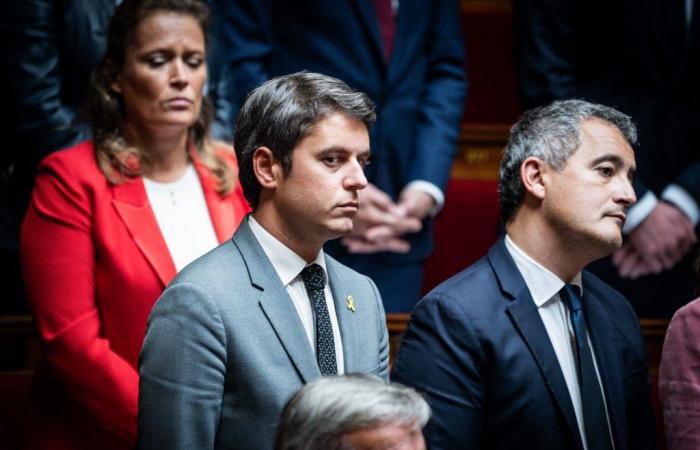
In the midst of examining the budget at the National Assembly, “Marianne” speaks with pollster Frédéric Dabi. The opinion general director of the Ifop group deciphers the interest of the French in economic and fiscal issues.
This is the start of a high-risk sequence for Michel Barnier. The Finance Committee began its examination of a particularly scrutinized budget on October 15, before the debates continued in public session.
In front of the deputies, the Prime Minister will have to juggle two almost irreconcilable imperatives: on the one hand, trying to get France out of a worrying economic situation with a spiraling deficit; on the other, give pledges to the various political forces of its untraceable majority who have already made it clear that they do not intend to remain passive. Gabriel Attal and Gérald Darmanin have expressed their doubts about tax increases while the right does not want to hear about the postponement of pension indexation.
However, what does public opinion learn from these electrical controversies? Are the French concerned about the economic situation and the announced tax increases? Marianne talks about it with Frédéric Dabi, general opinion director of the IFOP. He publishes with Brice Soccol Do we all speak the same language? published by Editions de l’Aube*, a work which explores the imagination of the French behind the recurring words of public debate, such as identity, climate or taxes.
Marianne : The examination of the budget began in the Assembly, in the context of a significant deficit. Do these seemingly technical financial questions arouse strong interest among the French?
Frédéric Dabi: Traditionally, there is always less interest in major macroeconomic issues compared to issues that directly affect the purchasing power of the French, such as inflation or, at one time, unemployment. When we conducted our qualitative studies for the book, a few months ago, debt was only very marginally in the spectrum of French people’s concerns. Nevertheless, in a short time there was a real phenomenon of acceleration.
READ ALSO: “It must exist”: Darmanin, to be a better winner?
In one year, the debt has gained around ten points of interest in our survey for Fiducial and Sud Radio on priority themes in the eyes of the French. The idea that debt interest could become the state’s largest expenditure item has taken root. There is also a strong interest in these budgetary issues because citizens now make an economic link between debt and taxes. With political speeches, there has been an acceleration in the awareness of the French.
You explain in your book how the question of taxes has become explosive in public opinion. Is this the case across all segments of the population?
When a politician talks about taxes, public opinion reacts even though 55% of households are not subject to income tax. Because the French have a much more extensive vision of taxation. In 2017, the increase in the CSG of retirees to compensate for the reduction in contributions, for example, sparked an outcry. Furthermore, for three or four years we have been at a moment where the question of purchasing power has replaced unemployment at the top of the French people’s concerns. From now on, the supreme injustice is no longer unemployment but work which pays poorly and which, what’s more, can be reduced by taxes.
Of course, the famous middle classes, who tell themselves that they are too rich to be helped but not rich enough to live well, feel particularly concerned by this theme. Generally speaking, consent to taxes has declined because the French are asking themselves the question of their real usefulness. There is an increasing feeling of paying taxes even though school is doing poorly or access to healthcare is complicated.
“From July 7 to the appointment of the government, the French enjoyed a breather. »
However, Michel Barnier promises that these tax increases will only target the highest incomes and large businesses.
Yes, moreover, when Michel Barnier initially spoke of tax increases without specifying who would be affected, things had clearly shifted in public opinion. Now the Prime Minister has clarified his intentions. We are certainly not in an automatic mistrust as was the case during François Hollande’s “fiscal shock” which caused his first major loss of popularity, but the situation remains eruptive. Even though only 0.3% of households should see their taxes increase, the middle classes have the feeling of a sword of Damocles which could fall on them next time.
On a political level, who risks suffering the most from the worrying and poorly anticipated economic situation? Will distrust focus on Emmanuel Macron?
The death knell will sound for almost everyone. Certainly, the idea of Emmanuel Macron as “Mozart of finance” will undoubtedly take a hit during the commission of inquiry but the left would be wrong to rejoice because it is the political class as a whole which will be weakened. All this will entrench distrust. Only those who have never been in power, like Marine Le Pen, are likely to benefit, even though the economic project of the National Rally (RN) proposes significant spending.
For its part, the right seems paradoxically more concerned by the question of postponing the indexation of pensions than by tax increases. How do you explain this?
The category of retirees represents a clientele, a sort of electoral totem, a bit like young people who, conversely, count for little electorally but who must be spoken to to show that we are defending a France open to the future. Where politicians make a mistake is that a candidate can perfectly lose a presidential election even if he overwhelmingly has the vote of elderly people, like Nicolas Sarkozy in 2012. On the other hand, no one has ever won a presidential election without having France works with him.
More generally, one of your latest surveys for Paris Match, Fiducial and Sud Radio shows that despite the unprecedented institutional situation, government policy is not so omnipresent in French conversations. After voting massively in July, have the French grown tired of political twists and turns?
It is true that Michel Barnier can benefit from a sort of political fatigue among the French who have the feeling of having seen them too much during the European and then the legislative electoral campaigns. During the period which extended from July 7 to the appointment of the government, the French enjoyed taking a breather. Traditionally, September is the month when households are very interested in purchasing power but this time there is not the same polarization as usual.
READ ALSO: Ian Boucard, LR MP in favor of increasing taxes on the richest: “Tax justice does not scandalize me”
We are in a particular momentum with a form of demand for appeasement. But we can ask ourselves: is this not the calm before the storm?
***
*Frédéric Dabi and Brice Soccol, Do we all speak the same language? How imagination transforms FranceÉditions de l’Aube, 2024.





